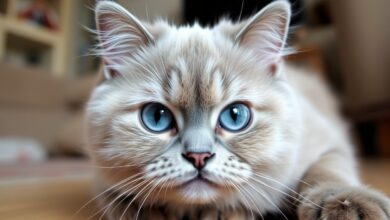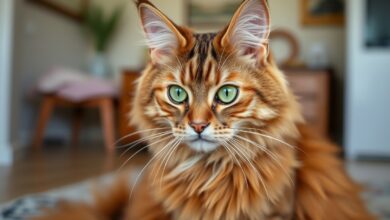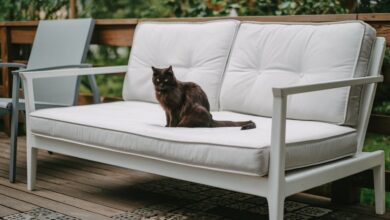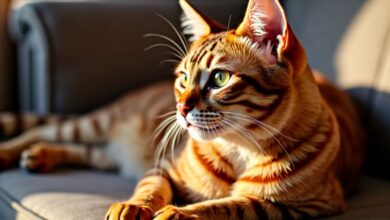Maine Coon Size Chart – Track Your Cat’s Growth
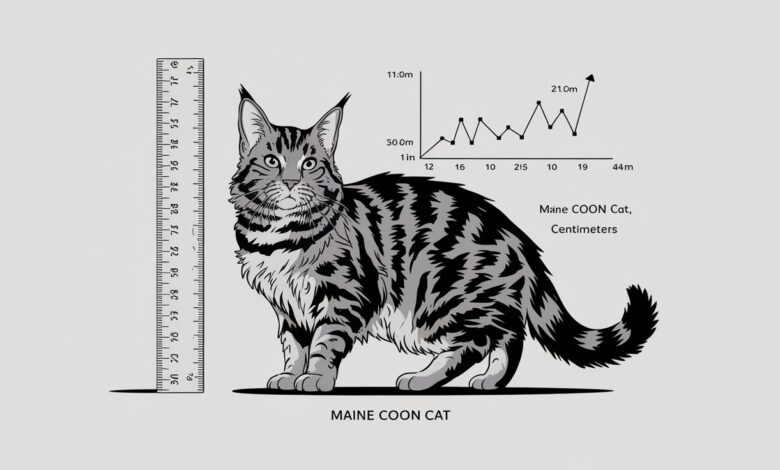
With a Maine Coon’s remarkable size and unique characteristics, understanding their growth patterns is crucial for ensuring your cat’s health and well-being. This informative size chart will help you track your furry companion’s growth stages, from kittenhood to adulthood, allowing you to make informed decisions about their care and nutrition. By monitoring your Maine Coon’s weight and dimensions, you can identify potential health concerns early and provide the best environment for your beloved pet’s development.
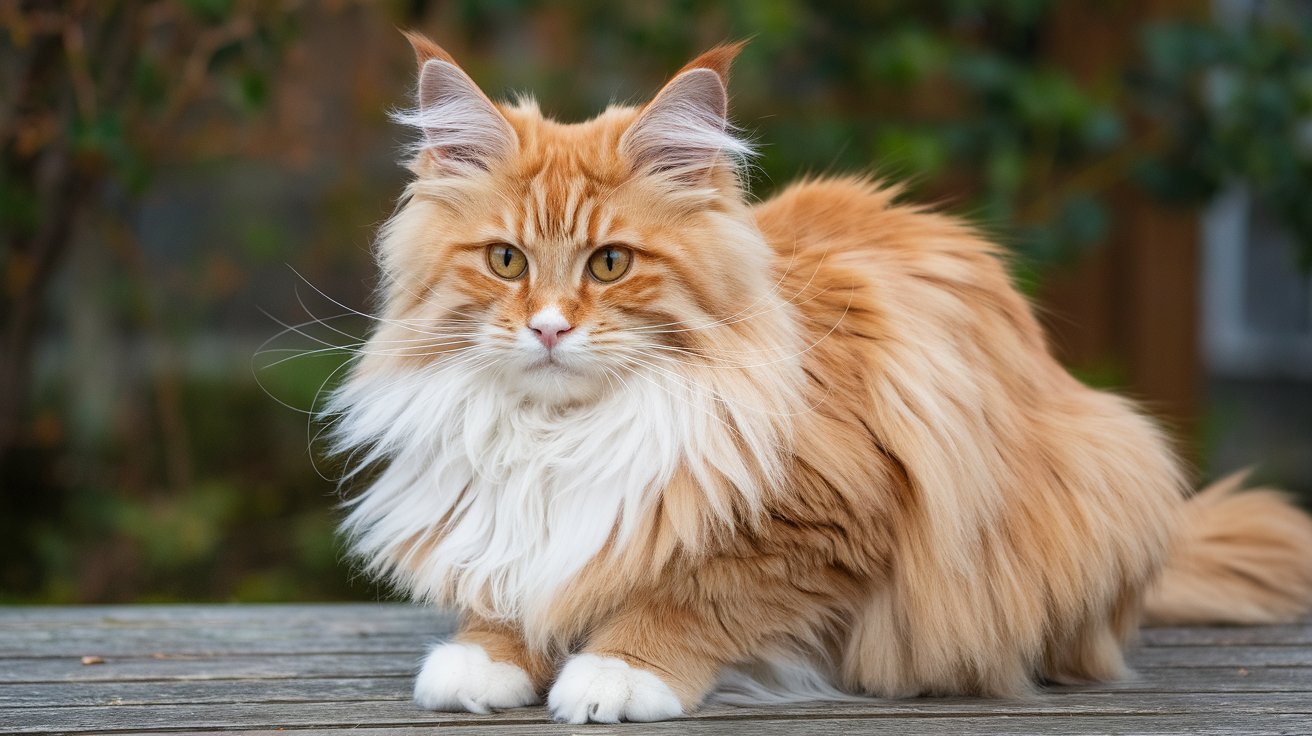
Key Takeaways:
- Growth Stages: Understanding the different growth stages of Maine Coons is crucial for tracking their development from kitten to adult.
- Weight & Measurements: Regularly measuring your cat’s weight and size against a Maine Coon size chart helps to ensure they are growing properly and maintaining a healthy physique.
- Health Monitoring: Keeping an eye on your Maine Coon’s growth can help identify health issues early, allowing for prompt veterinary attention if needed.
Understanding Maine Coon Growth Patterns
Your Maine Coon’s growth pattern is unique and can provide insight into their overall health and development. It is crucial to understand that Maine Coons are one of the largest domestic cat breeds, and their growth trajectory differs from that of regular-sized cats. Monitoring their growth will help you ensure they are progressing well and highlight any potential health issues that may arise during their growth stages.
Early Growth Stages
Patterns of growth in Maine Coons usually start rapidly in the first few weeks of life. From birth to around 4 months old, your kitten will experience significant weight gain, doubling in size by the time you reach 8 weeks. During this stage, good nutrition and regular veterinary check-ups are crucial for healthy development.
Growth Milestones
Early milestones are critical indicators of your cat’s health and growth progression. Between 4 to 8 months, Maine Coons will develop muscle mass, start to exhibit their characteristic large features, and gain considerable weight. It’s vital to track these milestones to ensure your cat is achieving healthy growth rates.
Stages of growth milestones for Maine Coons often include notable changes in weight and height during the first year. By six months, you may see an increase in weight to about 6 to 10 pounds, with further growth expected until they reach their full size around 3 to 5 years. Observing these growth leaps can reassure you that your Maine Coon is developing properly. Additionally, keeping an eye on any fluctuations in their growth can help identify potential health risks early on, allowing for timely intervention if necessary.
Factors Influencing Size
You may be surprised to learn that various factors can significantly influence your Maine Coon cat’s size. These factors include:
- Genetics
- Nutrition
- Health
- Age
After considering these aspects, you can better understand your cat’s growth potential and track their development effectively.
Genetics
For your Maine Coon’s size, genetics play a crucial role. Each cat inherits genetic traits from both parents, including those that determine growth rates and ultimate size. If your cat comes from a lineage of large Maine Coons, it’s likely they’ll grow to be sizable themselves.
Nutrition
To ensure your Maine Coon reaches its full potential, proper nutrition is indispensable. A balanced diet full of high-quality proteins, fats, and imperative vitamins supports healthy growth and development.
Size and overall health of your Maine Coon is primarily a reflection of its nutrition. It’s crucial to feed your cat a diet rich in high-quality protein to support muscle development and growth. Additionally, avoid overfeeding, which can lead to obesity and related health issues. Ensure access to clean water and consider consulting your veterinarian for a tailored diet plan. Keep in mind, a well-nourished Maine Coon is more likely to achieve its genetic potential and maintain a robust health profile.
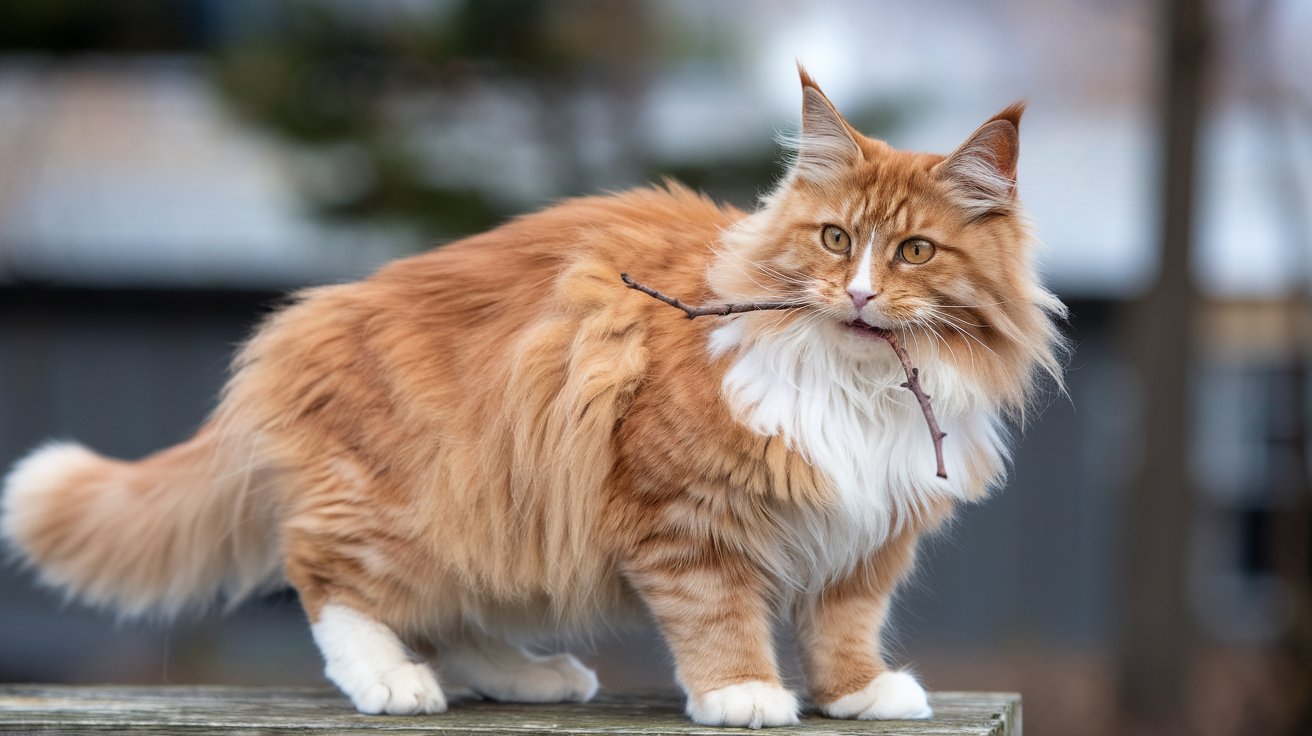
Measuring Your Maine Coon
Not all Maine Coons are created equal, and understanding their growth trajectory is crucial for ensuring your furry friend stays healthy and happy. Measuring your cat correctly allows you to keep track of their development and helps identify any potential health issues early. With proper techniques and a consistent schedule, you can effectively monitor their growth and well-being.
Proper Measurement Techniques
Proper measurement of your Maine Coon involves using a tape measure for both length and height, taking special care to hold the tape straight against the body. Start from the tip of the nose to the base of the tail for length, and for height, measure from the ground to the top of the shoulder. Make sure your cat is standing on a flat, sturdy surface to ensure accurate results. Consistency is key—always measure at the same time of day and under similar conditions.
Tracking Weight and Height
On a regular basis, keeping track of your Maine Coon’s weight and height helps ensure they are growing properly. This can be done by weighing your cat on a scale and noting it down alongside their height measurements. Both weight and height should be monitored every few weeks, especially during their rapid growth stage. Regular tracking can reveal patterns in your cat’s growth and help you consult your veterinarian if anything seems amiss.
For instance, it’s important to note that Maine Coons can grow significantly during their first year, often reaching up to 25 pounds or more when fully grown. Tracking their weight and height can prevent obesity, which is a common risk in larger breeds and can be detrimental to their health. A sudden increase or decrease in weight may indicate underlying health problems, so continuously monitoring these metrics is crucial. Always ensure your Maine Coon is within a healthy range for both height and weight to promote their overall well-being.
Maine Coon Size Comparisons
Now that you’ve learned about the Maine Coon’s overall size, it’s necessary to compare them with other breeds to better understand their unique characteristics. The following table outlines the average weights and heights of Maine Coons alongside popular feline breeds:
| Cat Breed | Average Weight (lbs) |
|---|---|
| Maine Coon | 10-25 |
| Siamese | 6-14 |
| Bengal | 8-15 |
| Persian | 7-12 |
Comparison with Other Breeds
One vital aspect of understanding your Maine Coon is recognizing how they stack up against other cat breeds. The following table highlights key size metrics for a clearer perspective:
| Breed | Average Height (inches) |
|---|---|
| Maine Coon | 10-16 |
| Sphynx | 8-10 |
| Ragdoll | 9-11 |
| British Shorthair | 12-14 |
Size Expectations by Age
Breeds come in various sizes which change as they mature. Understanding size expectations can help you ensure your Maine Coon is growing properly. Refer to the following data for average Maine Coon sizes at different ages:
Coon kittens are usually born weighing between 3-5 ounces. They experience rapid growth, typically reaching 8-12 pounds by their first birthday. You can expect males to reach their adult weight of 13-25 pounds and females 8-12 pounds by about 3-5 years of age. Keep in mind, the Maine Coon is known for its slow maturation, so regular vet check-ups are crucial to monitor growth and ensure they are healthy and thriving. Always be on the lookout for signs of obesity or stunted growth, as these can lead to serious health issues.
Common Health Considerations
To ensure your Maine Coon thrives, it’s vital to be aware of common health considerations. This breed is known for its size and strength, but it’s vital to monitor their health closely. Regular check-ups with your veterinarian will help catch potential issues early, allowing you to provide the best care as your cat grows.
Obesity Risks
The risk of obesity in Maine Coons can be significant due to their large size and tendency to overeat. Ensuring a balanced diet and encouraging regular exercise can help maintain a healthy weight. Monitor your cat’s food intake and provide engaging activities to prevent weight gain, as obesity can lead to serious health complications.
Growth-Related Health Issues
Any Maine Coon owner should be vigilant about growth-related health issues that may affect your cat as it matures. As large breeds tend to experience rapid growth, they can be susceptible to skeletal problems, particularly hip dysplasia and hypertrophic cardiomyopathy. Regular vet visits and monitoring growth patterns can help you catch any potential issues early.
Issues such as hip dysplasia and hypertrophic cardiomyopathy are not only common but can also be serious in Maine Coons. Hip dysplasia can lead to chronic pain and disability, impacting your cat’s quality of life. Hypertrophic cardiomyopathy, a condition that causes the heart muscle to thicken, can lead to heart failure if left untreated. Regular check-ups, a balanced diet, and appropriate exercise play crucial roles in keeping your Maine Coon healthy, helping to mitigate these risks as they grow.
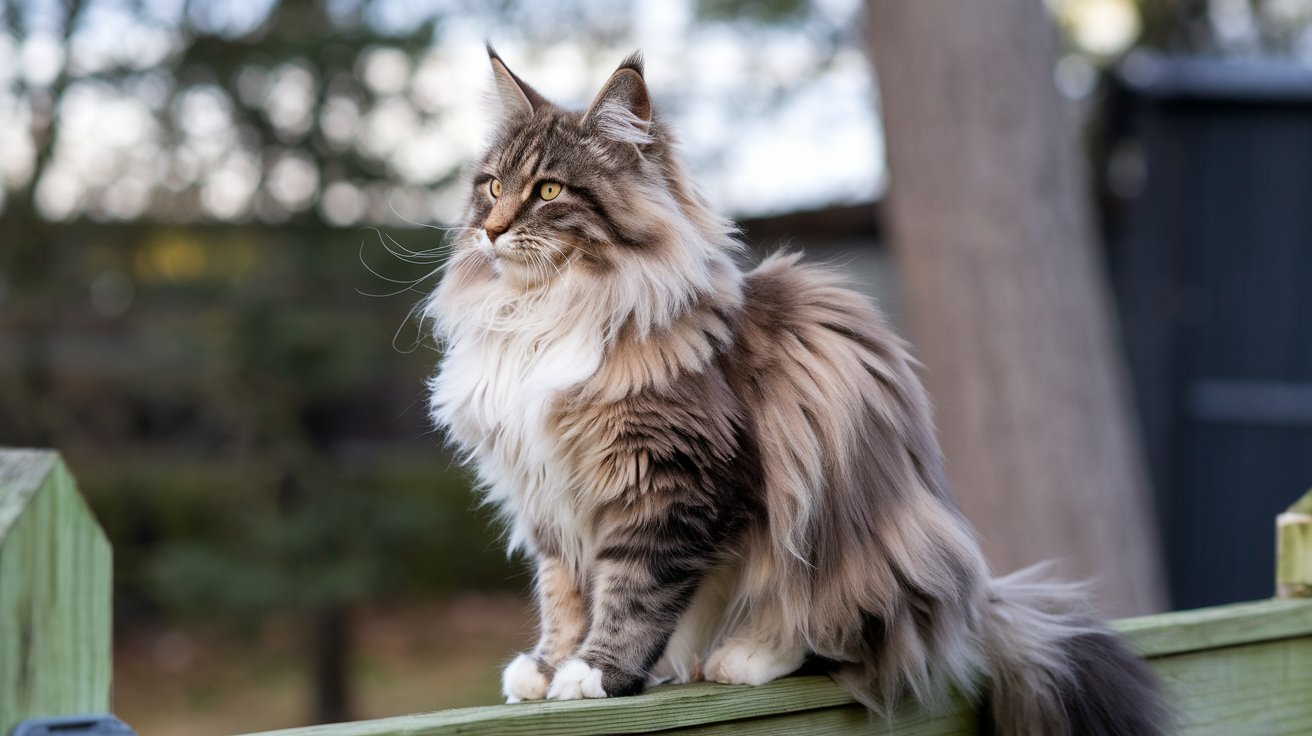
Tips for Owners
Many Maine Coon owners want to ensure their cats grow up strong and healthy. To track your Maine Coon’s growth effectively, consider the following tips:
- Regularly measure and record your cat’s weight
- Monitor their food intake
- Ensure a balanced diet
- Encourage physical activity
- Schedule veterinary check-ups
The more you observe and care for your Maine Coon, the better you can support their well-being.
Maintaining a Healthy Diet
One crucial factor in your Maine Coon’s growth is providing a balanced diet tailored to their developmental needs. High-quality cat food, rich in protein and crucial nutrients, will support their growth. Ensure you follow feeding guidelines specific to their age and size, and consult your veterinarian for personalized recommendations.
Exercise and Activity Levels
One way to ensure your Maine Coon stays healthy is by promoting regular exercise and activity levels. This breed is known for their friendly and playful nature, requiring ample physical and mental stimulation to thrive.
Understanding your Maine Coon’s need for exercise is vital for maintaining their overall health. Regular play sessions and access to climbing structures can help prevent obesity and other health issues. Engaging in interactive toys or games will not only keep them physically active but also sharpen their mental skills. Ensure you provide a safe environment for them to explore, as this satisfies their natural curiosity and prevents destructive behaviors. The combination of consistent physical activity and mental engagement will lead to a happy and well-adjusted Maine Coon.
Final Words
As a reminder, tracking your Maine Coon’s growth is necessary to ensure they are developing properly and maintaining a healthy size. By utilizing a Maine Coon size chart, you can monitor your cat’s weight and height over time. This information not only helps you know how big your furry friend will get, but it can also alert you to any health concerns. For more insights on this topic, check out How Big Does a Maine Coon Get? Average Weight & Growth …. Your cat’s health and growth journey is in your hands.
Maine Coon Size Chart – Track Your Cat’s Growth FAQ
Q: How can I track the growth of my Maine Coon kitten?
A: Tracking the growth of your Maine Coon kitten is imperative to ensure they are developing healthily and reaching their full potential size. Start by weighing your kitten weekly using a digital scale. Record the weight and compare it to a Maine Coon size chart, which typically outlines average weights at different ages. In general, Maine Coons grow rapidly in the first few months and may reach up to 8-12 pounds by 6 months old. Additionally, keep an eye on their length and height as they grow, noting any significant changes. Regular veterinary check-ups are also recommended to ensure that your kitten is growing normally and to rule out any health issues.
Q: When do Maine Coons reach their full size, and how can I tell if my cat is growing properly?
A: Maine Coons are one of the largest domestic cat breeds, and they can take up to 3-5 years to reach their full size. Typically, females weigh between 8-12 pounds, while males can weigh between 10-25 pounds when fully grown. To tell if your cat is growing properly, continuously compare their growth to the height and weight guidelines provided in a Maine Coon size chart. If your cat is significantly smaller or larger than average at their age, consult a veterinarian. Signs of proper growth include a healthy appetite, playful behavior, and shiny fur. A gradual, steady increase in weight is a good indicator of healthy growth.
Q: What factors can influence the size of my Maine Coon?
A: Several factors can influence the final size of your Maine Coon, including genetics, diet, and overall health. Genetic background plays a significant role, as larger parents often produce larger kittens. Nutrition is equally important; a balanced, high-quality diet formulated for kittens can promote healthy growth. Additionally, spaying or neutering can impact growth. Some studies suggest that spayed or neutered cats may grow larger than their intact counterparts, as the removal of hormones influences growth plate closure. Finally, regular veterinary care to monitor for any health issues will help ensure your Maine Coon reaches its full size potential. Maintaining a healthy lifestyle with plenty of exercise and mental stimulation also supports proper growth in Maine Coons.


